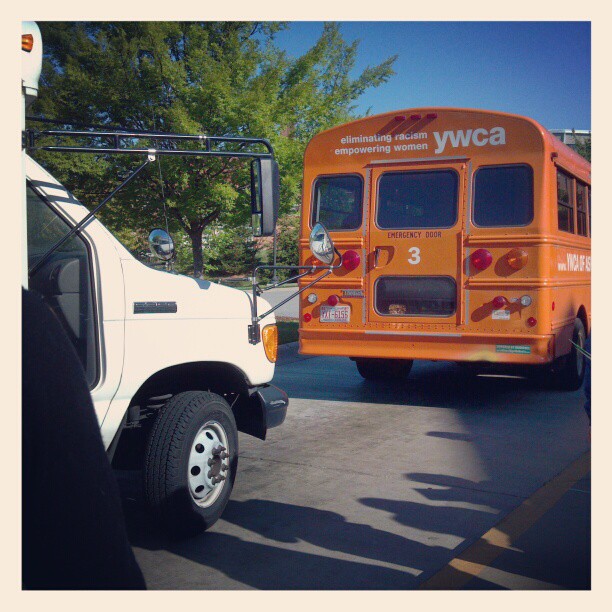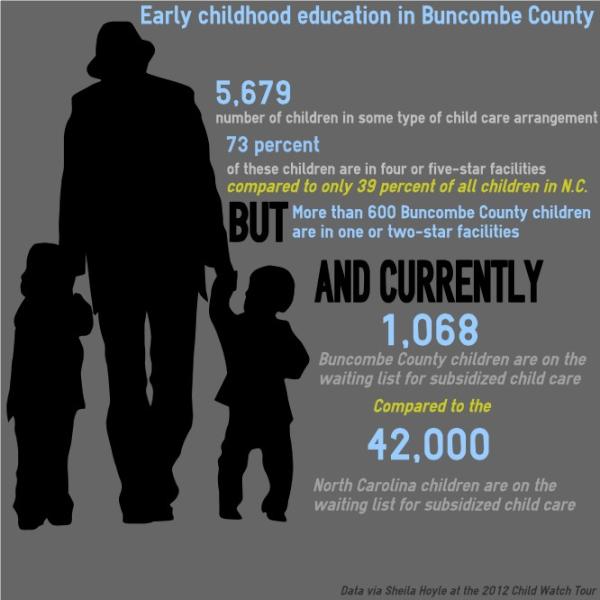As children made crafts for Mother’s Day in a classroom down the hall at Head Start Hillcrest, Vickie Lester let a few tears trickle down her face as she talked about the changes she has seen in her granddaughter since she enrolled her in the program two years ago.
“Growing up without a mommy or a daddy, it makes things hard for her. But she loves coming here, she loves learning and she likes to talk in Spanish with her little friends,” she said. In the fall, the proud grandmother added, her granddaughter will be enrolled in a private school.
For Nicole Mayfield, she’s seen her son Tyree transform from a quiet boy into a talkative one who will gladly spell his name for anyone, and everyone, he meets. “I knew he needed that socialization, and now I can’t seem to get him to stop talking,” she said.
As another mother added, “Learning is more than just the numbers and the letters. It’s so much more than that.”
And, as emphasized throughout this year’s Child Watch Tour (organized by Children First, Communities In Schools and the Junior League), the most important learning happens during a child’s first 2000 days — the length of time between when a child is born and enrolls in kindergarten. As Dr. Susan Mims of Mission Children’s Hospital explained, the first 2000 days of a child’s life are crucial when it comes to things like brain and cognitive development.
“When a child is born, the brain is the most immature organ at that time and continues to mature for decades,” Mims told the almost 75 people who attended the morning session at 8:30 a.m. Studies show during the first few years of life, 700 new neural connections are formed every second. However, these neural connections can be affected by a baby’s environment and experiences. This new research, Mims added, “Emphasizes that there is this window of opportunity to maximize development for every child. Early intervention is the proven tool to do that.”
In addition to cognitive development and social interactions, these first 2000 days can have an economic impact. As Robby Russell of Wells Fargo Bank explained, “We’re investing fewer dollars in this area (for early childhood education), we’ve got it wrong. We’re experiencing a skills gap. Technology brought much of this about.”

After the morning session, tour participants were divided into two separate groups to visit a total of four early child care facilities (two facilities per group) in Buncombe County. The facilities included Asheville City Schools Preschool, the YWCA of Asheville, Head Start Hillcrest and the Child Care Center at First Presbyterian Church. In the spirit of the tour, participants traveled to these locations by school bus.

Below are photos and stats from the tour that visited Head Start Hillcrest and the Child Care Center at First Presbyterian:
Head Start Hillcrest


Head Start Hillcrest serves about 72 families.
It is a five-star facility, which means it has the highest level of quality. All of its teachers hold college degrees.
At this time, between 50-60 people are on the waiting list for the facility.
Child Care Center at First Presbyterian Church

Child Care Center at First Presbyterian Church serves about 60 families.
It is a five-star facility, as well. The center offers an open door policy, and about 25 percent of the families it currently serves are on a voucher program.
At the end of the day, a luncheon was held at the Mountain Area Child and Family Center, another five-star facility. Below is an infographic about Buncombe County early education.

About 75 people attended the Friday event, including a handful of politicians and political candidates. This list of notable attendees include N.C. House Rep. Patsy Keever, N.C. House District 115 candidates Nathan Ramsey and Susan Wilson and District 3 Buncombe County commissioners candidates Terry Van Dynn and David King. Also in attendance were John Mitchell, Senator Richard Burr’s western field representative, and John Gilliam, the governor’s western representative.




Before you comment
The comments section is here to provide a platform for civil dialogue on the issues we face together as a local community. Xpress is committed to offering this platform for all voices, but when the tone of the discussion gets nasty or strays off topic, we believe many people choose not to participate. Xpress editors are determined to moderate comments to ensure a constructive interchange is maintained. All comments judged not to be in keeping with the spirit of civil discourse will be removed and repeat violators will be banned. See here for our terms of service. Thank you for being part of this effort to promote respectful discussion.